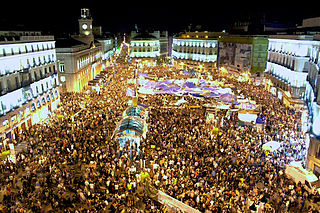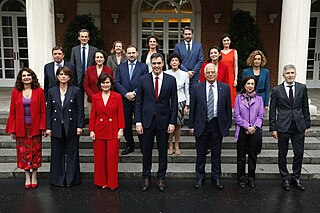
Pedro Rodríguez de Campomanes y Pérez, 1st Count of Campomanes, was a Spanish statesman, economist, and writer who was Minister of the Treasury in 1760. He was an adherent of the position that the state held supremacy over the Church, often called Erastianism. Campomanes was part of the government of Charles III. A staunch anti-Jesuit, one of the biggest foes of the order, Campomanes was the main driving force behind their expulsion.

Eskalera Karakola is a feminist self-managed social centre in Madrid, Spain. Women squatted a bakery on Calle de Embajadores 40 from 1996 until 2005, whereupon they were given a building at Calle de Embajadores 52.

Patio Maravillas was a multi-purpose self-managed social centre which occupied several spaces in central Madrid between 2007 and 2015.

The Plaza de Lavapiés is a public square in the city of Madrid, Spain. It is located in the area of the same name, Lavapiés.

The anti-austerity movement in Spain, also referred to as the 15-M Movement, and the Indignados Movement, was a series of protests, demonstrations, and occupations against austerity policies in Spain that began around the local and regional elections of 2011 and 2012. Beginning on 15 May 2011, many of the subsequent demonstrations spread through various social networks such as Real Democracy NOW and Youth Without a Future.

Kukutza was a gaztetxe in the neighbourhood of Recalde, Bilbao. It operated as a squatted free space between 1996 and 2011. It was used as a youth, unemployed and cultural centre. In those 15 years it had 3 different buildings. The first one, Kukutza I, was used in 1996 and just for 3 months, then Kukutza II in 1998 and for 2 months, and finally, Kukutza III, open between 1998 and 2011 and had a large activity programme. It was set in an abandoned factory and closed in 2011 because it was violently evicted by the police.

Errekaleor is a neighbourhood on the periphery of Vitoria-Gasteiz, in the Basque Country, Spain. It sits on the plateau created by the Errekaleor river, which is part of the Green Belt of Vitoria-Gasteiz. From 2013 onwards, the area was occupied by squatters and became known as Errekaleor Bizirik. The project is based on the principles of workers' self-management, consensus based decision making, feminism, anti-capitalism and Basque cultural re-invigoration. The neighbourhood is the largest occupied space of its type on the Iberian Peninsula, with over 10 hectares of land and 150 inhabitants. Residents include children, the elderly, blue-collar workers, the unemployed, students, and teachers. The project includes an organic farm of 2 hectares, a bakery, a bar, a social centre, a library, a theatre, a free shop, a recording studio, and other projects.

Valencian Art Nouveau is the historiographic denomination given to an art and literature movement associated with the Art Nouveau in the Valencian Community, in Spain.

The first government of Pedro Sánchez was formed on 7 June 2018, following the latter's election as Prime Minister of Spain by the Congress of Deputies on 1 June and his swearing-in on 2 June, as a result of the success of a motion of no confidence against Mariano Rajoy. It succeeded the second Rajoy government and was the Government of Spain from 7 June 2018 to 13 January 2020, a total of 585 days, or 1 year, 7 months and 6 days.
In the run up to the 2019 Spanish local elections, various organizations carried out opinion polling to gauge voting intention in local entities in Spain. The results of such polls for municipalities in the Community of Madrid are displayed in this article. The date range for these opinion polls is from the previous local elections, held on 24 May 2015, to the day the next elections were held, on 26 May 2019.

The 2023 Madrid City Council election, also the 2023 Madrid municipal election, was held on Sunday, 28 May 2023, to elect the 12th City Council of the municipality of Madrid. All 57 seats in the City Council were up for election. The election was held simultaneously with regional elections in twelve autonomous communities and local elections all throughout Spain.

The COVID-19 pandemic in Spain had its first case in the Community of Madrid on 25 February 2020.

Squatting in Spain refers to the occupation of unused or derelict buildings or land without the permission of the owner. In Francoist Spain migrant workers lived in slums on the periphery of cities. During the Spanish transition to democracy, residential squatting occurred in Spanish cities such as Barcelona, Bilbao, Madrid, Valencia and Zaragoza. From the 1980s onwards a new generation of squatters set up self-managed social centres which hosted events and campaigns. The 1995 Criminal Code among other things criminalised squatting, but failed to stop it. Social centres exist across the country and in Barcelona and Madrid in particular. In the Basque Country they are known as gaztetxes.

Mónica García Gómez is a Spanish anesthesiologist and politician, current coordinator and spokesperson of the political party Más Madrid in the Madrilenian Assembly. She was an elected deputy during the X legislature of the Madrilenian Assembly under the Spanish political party Podemos, and is currently a deputy in the XI legislature as part of Más Madrid. Since 2015, García has combined her political work with her job in health care, with a 50% reduction in working hours. She was appointed Minister of Health in the third government of Pedro Sánchez following the 2023 Spanish general elections.
On 20 January 2021, an explosion occurred in a building on Calle de Toledo in Madrid, Spain, causing it to partially collapse. The blast killed four people and wounded ten others.

Chanti Ollin was a self-managed social centre in Mexico City, Mexico, between 2003 and 2017. It was occupied in 2003 by students from the 1999–2000 UNAM strike and participants in Okupa Che. It was a derelict five storey building at Calle Melchor Ocampo 424 in Cuauhtémoc. The name means "house in motion" in the Nahuatl language.
In the run up to the 2023 Spanish local elections, various organisations carry out opinion polling to gauge voting intention in local entities in Spain. Results of such polls for municipalities in the Community of Madrid are displayed in this article. The date range for these opinion polls is from the previous local elections, held on 26 May 2019, to the day the next elections will be held, on 28 May 2023.
In the run up to the November 2019 Spanish general election, various organisations carried out opinion polling to gauge the opinions that voters hold towards political leaders. Results of such polls are displayed in this article. The date range for these opinion polls is from the previous general election, held on 28 April 2019, to the day the next election was held, on 10 November 2019.

Calle de Preciados, is a public pedestrian street in central Madrid, Spain, which spans from Puerta del Sol to Plaza de Santo Domingo via Plaza de Callao, where it takes a bend. It is about 500-metre long.


















